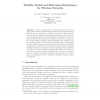Free Online Productivity Tools
i2Speak
i2Symbol
i2OCR
iTex2Img
iWeb2Print
iWeb2Shot
i2Type
iPdf2Split
iPdf2Merge
i2Bopomofo
i2Arabic
i2Style
i2Image
i2PDF
iLatex2Rtf
Sci2ools
COORDINATION
2009
Springer
2009
Springer
Mobility Models and Behavioural Equivalence for Wireless Networks
In protocol development for wireless systems, the choice of appropriate mobility models describing the movement patterns of devices has long been recognised as a crucial factor for the successful evaluation of protocols. More recently, wireless protocols have also come into the focus of formal approaches to the modelling and verification of concurrent systems. While in these approaches mobility is also given a central role, the actual mobility modelling remains simplistic since arbitrary node movements are allowed. This leads to a huge behavioural overapproximation that might prevent a successful reasoning about protocol properties. In this paper we describe how to extend a process calculus by realistic mobility models in an orthogonal way. The semantics of our calculus incorporates a notion of global time passing that allows us to express a wide range of mobility models currently used in protocol development practice. Using the behavioural equivalence and pre-order of our calculus, we...
Actual Mobility Modelling | Appropriate Mobility Models | COORDINATION 2009 | Parallel Computing | Realistic Mobility Models |
| Added | 25 Nov 2009 |
| Updated | 25 Nov 2009 |
| Type | Conference |
| Year | 2009 |
| Where | COORDINATION |
| Authors | Jens Chr. Godskesen, Sebastian Nanz |
Comments (0)

